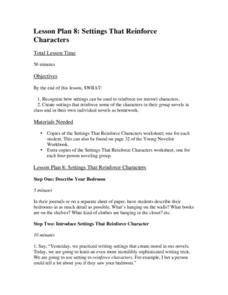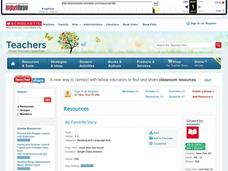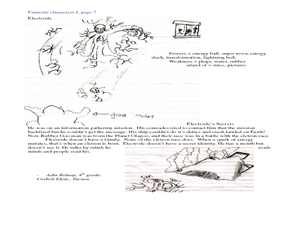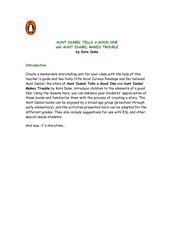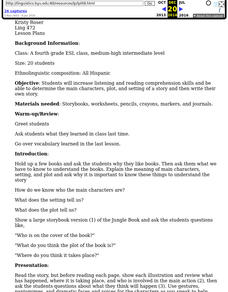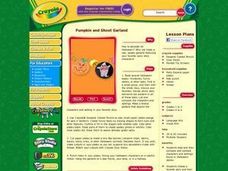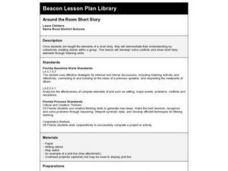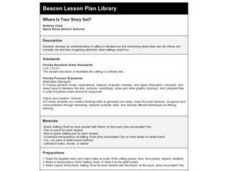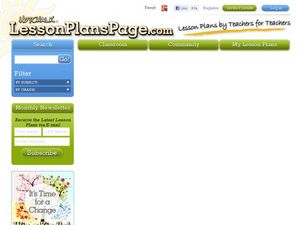Curated OER
Lesson 8: Settings that Reinforce Characters
The best way to be a good writer is to read good writing. Learners read and discuss an excerpt from a book that will help them comprehend the relationship between setting and character. They will use what they've gleaned from discussion...
Curated OER
Plot and Conflict in W.W. Jacob's "The Monkey's Paw"
Tenth graders analyze the use of literary elements in W.W. Jacob's "The Monkey's Paw." Literary analysis is accomplished by a review of the plot and order of events in the story. Learners work in pairs to match the events from the story...
Curated OER
My Favorite Story
Learners discuss their favorite book. In this book discussion instructional activity, students name the title and tell what makes the book special. Learners also review the setting, plot, conflict, and resolution. Students make a book...
Curated OER
Story Creation Magic: Character, Setting, Plot
Students review the terms plot, setting, and characters and examine how all of these elements are needed to make a story. They are given parts of stories and they try to identify all of those parts of the story.
Curated OER
Applying Character and Setting to Play Readings
Read Ira Sleeps Over, then identify elements of plays that are also common to books. Learners analyze character and setting, consider how these elements relate to a play, then write a one-paragraph skit using the characters from Ira...
Curated OER
Creating Characters
Learners examine the methods of effective characterization. In this writing skills lesson, students discuss how emotions, dialogue, actions, and physical descriptions build believable characters. Learners then use the methods of...
Curated OER
Noisy Nora, Studious Students: Story Elements
Alliterative adjective nicknames generate stories inspired by Rosemary Wells' book Noisy Nora (also a thematic complement to any class with children who make a ruckus to get attention). Class members explore basic story elements --...
Curated OER
fantastic Characters
Students study stories. In this writing lesson, students discuss the three aspects of a story, read stories focusing on the characters, write a story as a class about a character made up by the class, and write a story with an exciting...
Curated OER
Adventure Writing: Oregon's Landscape as a Setting
Students identify geographical features of different regions encountered by migrants on the Oregon trail. Students research how the Oregon landscape may have affected life and 19th century westward migration. Students write a narrative...
Curated OER
Aunt Isabel Tells a Good One...
Explore language arts by reading two similar stories in order to compare and contrast them in class. Young readers read two Aunt Isabel books, by Kate Duke, and discuss the main characters, plot, and setting. They complete a graphic...
Curated OER
The Similarities and Differences of Setting
Sixth graders identify components of the setting in science fiction text. In this compare and contrast settings lesson plan, 6th graders read Only You Can Save Mankind and identify similarities and differences between science...
Curated OER
The News Behind the Story
What a fun way to analyze plot, setting, and character. Learners review story elements, read a short fictional story, then turn the events of that story into a headlining news paper article. Not only does this lesson engage critical...
Curated OER
Language Practice
The simple instructional techniques described in this plan will help young readers learn and practice basic reading skills and strategies. Before reading, introduce your readers to the meaning of main character, setting, and plot. Then...
Curated OER
What Makes a Novel a Novel?
They always say to write what you know. This approach is used to get middle schoolers prepared to write novels of their own. Using a favorite book as a model, potential novelists respond to prompts that ask about characters, plot, main...
Curated OER
Story Pyramids
Young writers generate descriptive words. They use pictures of various landscapes (from books, magazines, or the Internet) and complete a story pyramid. The pyramid (included here) asks to describe the main character, the setting, and...
Curated OER
Create a Playbill!
Seventh graders explore the various elements found in the advertisement of a dramatic experience. Playbills are created that reflect the plot without revealing the climax of the play. Costumes, set construction, and character description...
Curated OER
Pumpkin and Ghost Garland
Reading scary stories on Halloween is frightfully good fun! As elementary learners read several stories for the holiday, they choose a favorite and create a decorative garland representing the characters and setting elements found...
Curated OER
Comparing Characters Across Two Short Stories
Ninth graders listen to a read aloud of two short stories focusing on literary devices. The write about the settings and realism of the stories, and decide each main character handles the conflict he faces with nature.
Curated OER
Around the Room Short Story
Collective story writing is a great way to reinforce the concept of story elements and collaborative learning. Young writers discuss story elements such as, setting, character, action, climax, conclusion, foreshadowing, dialogue, and...
Reed Novel Studies
Three Times Lucky: Novel Study
A car crash, a murder, a hurricane. With such a plot, why is the title of Sheila Turnage's novel Three Times Lucky? After making a prediction about the plot, scholars use the novel study to research and record facts...
Curated OER
Comparing Themes and Plots: "Young Goodman Brown" and "The Minister's Black Veil"
Students read two stories by Nathaniel Hawthorne and write an essay comparing plots and themes. In this Nathaniel Hawthorne short stories lesson, students read "Young Goodman Brown" and "The Minister's Black Veil." After a class...
Curated OER
Character's Qualities
Sixth graders analyze the a character's qualities and the effects of these qualities on the plot and the resolution of the conflict in the story "The Pigman and Me." They develop a list of the qualities, discuss if these qualities were...
Curated OER
Where Is Your Story Set?
Students explore the concept of setting in literature by identifying their own current setting, and imagining what their ideal setting would be. They read a piece of literature, identify the setting and record the information on a chart.
Curated OER
Create - A - Story
Apply the elements of a story to create an original story. They select a character, setting, and plot out of a bag, and write an original story tying the three story elements together.
